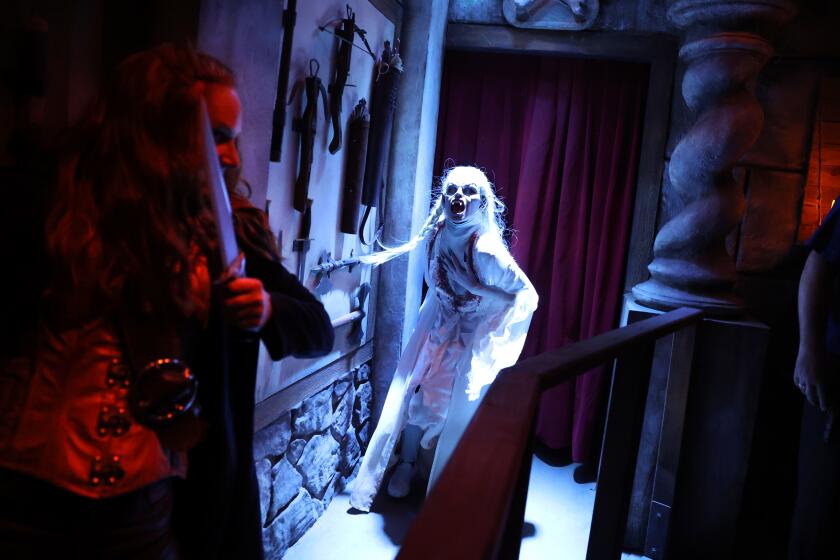Borscht Belt endures with a pasta buckle
It’s a lazy Saturday at the Villa Roma hotel, and the scene is what you’d expect in the Borscht Belt: Parents are schmearing kids with sunscreen at the swimming pool, the packed dining room serves way too much food and at night a stand-up comic cracks jokes about sex and senior citizens.
“You know when you’re getting senile?” comedian Mal Z. Lawrence asks the crowd. “It’s when you’re driving and your turn signal has been on for a week and a half.” Boom! goes the big bass drum, and the audience yuks it up, just as crowds have for decades in the heavily Jewish vacation mecca.
Here in the Sour Cream Sierras, people eat, laugh, then eat some more. But at the Villa Roma, you’d better check some of those stereotypes at the door. Instead of matzo balls and Manischewitz, the tables are groaning with meatballs and mozzarella. Kids’ T-shirts push “Luigi’s Calzone” and “Grandma Millie’s Sicilian Rice Balls,” while old-timers sit quietly under trees, sharing stories over glasses of Chianti. An afternoon Mass held in the nightclub draws a large crowd, and the boccie courts are busy.
“People don’t realize it, but there is a strong Italian presence in the Catskill Mountains,” says Marty Passante, Villa Roma’s owner. “We’ve been here a long time, we make a good living and we offer people a home away from home.”
Passante, a former actor and orange juice salesman, doesn’t like to brag, but his buona fortuna stands out in a region that has been suffering from economic distress. At its height, in the 1940s and ‘50s, Sullivan County boasted more than 200 hotels. Only five remain. While one famous Jewish resort after another has closed here in recent years--victims of poor management and changing vacation tastes--the Villa Roma, tucked into a remote corner of the mountains 100 miles north of New York, is a thriving anomaly. Although the hotel welcomes guests of all backgrounds, the clientele is 80% Italian American, mostly from metropolitan New York.
While Lawrence says he does the same schtick in a Jewish or Italian hotel, he peppers his routine here with punch lines such as “Prosciutto, baby!”
Thursday is “Caesars” night, and hotel employees, dressed in Roman togas, welcome guests to a banquet. On the hotel lawn, two silver-haired grandpas are criticizing a Yankee pitcher: “Marone! He thinks too much!” shouts one.
On a summer weekend, all 210 rooms are sold out, along with 192 time-shared suites. It is hard to find a chair near the pool, but most guests aren’t complaining.
“My family has come here for 15 years,” says Valerie De Mato, 44, a New York public school teacher. “The beauty of this place is, I have a sense of community. I’m with people who make me feel comfortable.”
Just down the road, in stark, ghostly contrast, the Concord Hotel, one of the last gargantuan Jewish resorts, is no more. Owners filed for bankruptcy last year, and now every piece of property is for sale, from dusty beds to old kitchen utensils. The once boisterous dining room is eerily silent, and the synagogue is a dusty memory, with prayer books and yarmulkes scattered on the floor.
Why did Villa Roma thrive while other hotels failed? Most observers agree that Passante, unlike his competitors, kept up with changing times. Once-loyal vacationers started to avoid the Catskills with the onset of home air-conditioning and cheap plane fares to more exotic places. But the Villa Roma built time-sharing units in 1982, while The Concord, Grossingers and other hotels failed to make such innovations.
And Passante plowed profits back into his resort, while others let their hotels go to seed. He kept expanding, building a golf course even as rumors grew that state officials would finally permit organized gambling in the economically hard-pressed area. Some owners stood pat, expecting big corporate buyouts. Yet there is no indication when, or if, gambling will ever come to the Catskills.
When he bought Villa Roma in 1969, the owner says, he caught a wave of rising Italian American affluence. Many people like him were becoming supervisors or managers, Passante explains, and they had the money to take vacations with their families. But along with economic success came the inevitable question:
“Who are you with?” some vacationers asked Passante with a wink. It was a clear allusion to the Mafia, and the owner noted that his is the only New York family that built the resort.
“You just can’t shake the mob thing, especially when you’re an Italian American,” he says with a sigh.”
“We can’t catch a break,” says De Mato. “If TV could show a black family like the Huxtables on ‘The Bill Cosby Show,’ why can’t they show the kind of values that most Italians have?”
Family values, like Saturday dinner at the Villa Roma: The waiter wishes you “buona sera” as the sun sets over hills that look a little like Tuscany--and if you hustle fast enough, there’s time for one last game of boccie.
Sign up for The Wild
We’ll help you find the best places to hike, bike and run, as well as the perfect silent spots for meditation and yoga.
You may occasionally receive promotional content from the Los Angeles Times.



